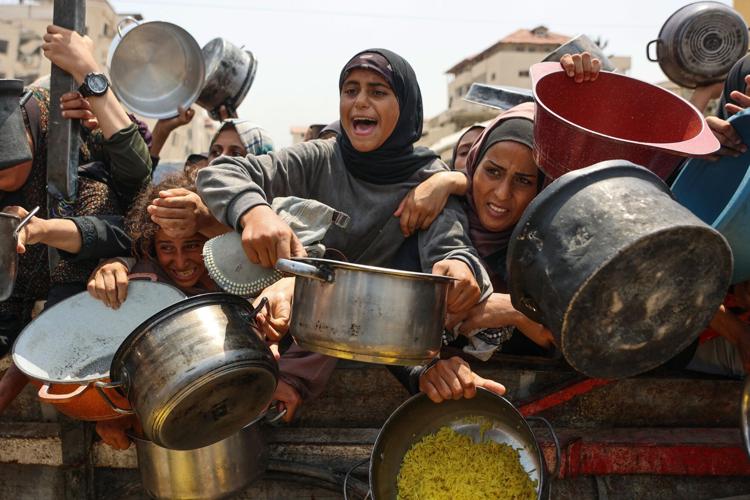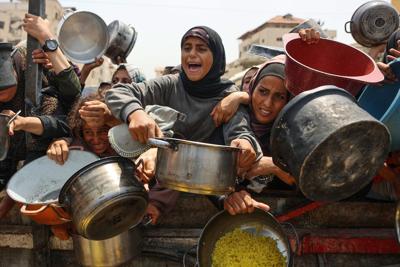ThereÔÇÖs a growing gulf in this country ÔÇö not just between political parties or between Canadians of different backgrounds, but between the Canadian public and the institutions that claim to represent them.
The latest Angus Reid poll confirms what many have long sensed: Canadians want their government to show moral courage on Gaza. even if it angers Donald Trump. Only 20 per cent think Canada should back down to preserve relations with the U.S.
On July 30, Prime Minister Mark Carney announced┬á condemning IsraelÔÇÖs role in allowing a humanitarian catastrophe to unfold in Gaza. On Aug. 8

A man wearing a cap with an anti war slogan stands during a rally by retired and reserve Israeli Air Force pilots calling for an immediate end to the war and urgent action to repatriate the hostages captive in Gaza since October 2023, on Tuesday, outside the Israeli Army headquarters in Tel Aviv, following the Israeli government’s decision to occupy Gaza City.┬á
AFP Contributor#AFP AFP via Getty ImagesThese statements marked a departure from the earlier, more cautious tone ÔÇö but for many Canadians, they came too late, and still fall short of the decisive action the moment demands. The polling reflects that gap: Canadians are increasingly ready for a more independent, principled foreign policy, while Ottawa remains hesitant to match words with consequences┬áin the face of pro-Israel lobbying pressure.
WhatÔÇÖs striking isnÔÇÖt just that the public mood has shifted ÔÇö itÔÇÖs how isolated that mood remains in institutional Canada. Politicians increasingly feel comfortable acknowledging the scale of devastation. Since October 2023, over 60,000 Palestinians have been killed, the vast majority women and children, with entire neighbourhoods reduced to rubble and famine used as a weapon of war. Yet, too many politicians have stopped short of demanding measures against Israel, such as sanctions, arms embargoes, or full recognition of Palestinian statehood.
While trade unions, student groups and grassroots organizations have raised their voices, some of the most powerful professional bodies in Canada ÔÇö from ╠ř▓╣▓ď╗ň bodies to academic institutions ÔÇö have responded with muted statements, if any at all.
In some cases, members have been disciplined or disinvited for expressing solidarity with Palestinians or condemning Israeli war crimes. As Manitoba Healthcare Workers for Palestine recently put it, ÔÇťThere has been shameful silence on the part of employers, regulatory bodies and unions on the atrocities being carried out in Gaza, especially notable when compared to the vocal response and solidarity readily expressed with Ukraine.ÔÇŁ
This timidity isnÔÇÖt just morally hollow, itÔÇÖs historically indefensible for institutions that claim to stand for justice and equity.
Why is public opinion shifting now?
Part of it is the sheer scale and visibility of the devastation. But more recently, images of starvation, broader mainstream coverage, attention from prominent Canadians like former ╠ř▓╣▓ď╗ň attention from celebrities ÔÇö including childrenÔÇÖs content creator ÔÇö as well as unexpected voices like MAGA-aligned influencers and Candace Owens have pushed the crisis into spaces where it was once ignored. Palestinians are still telling their own stories in real time, but now more Canadians are seeing, sharing, and believing them.
That raw visibility has made the gap between public outrage and institutional restraint impossible to ignore ÔÇö and it has left many Canadians disillusioned with traditional sources of moral leadership.

Mourners place the body of Al Jazeera correspondent Anas al-Sharif, who was killed alongside other journalists in an overnight Israeli strike on their tent in Gaza City, on a table ahead of a funeral procession in Gaza City on Monday. 
AFP Contributor#AFP AFP via Getty ImagesOmar El AkkadÔÇÖs searing new book, “One Day, Everyone Will Have Always Been Against This,” captures this exact moment ÔÇö and its moral cost. It imagines a future in which everyone claims they opposed atrocities, even if they stood by silently while they were happening.
In a recent interview with the ╔ź╔ź└▓ Star, El Akkad spoke of losing faith in institutions ÔÇö political, academic, cultural, journalistic ÔÇö while gaining respect for individuals who speak out at great personal risk: ÔÇťIÔÇÖve seen immense acts of courage and IÔÇÖve seen immense acts of love,ÔÇŁ he said, pointing to young student protesters, Palestinian journalists and doctors in Gaza. ÔÇťTheyÔÇÖve been the only outlet of information and survival.ÔÇŁ
And increasingly, itÔÇÖs not just the public ÔÇö but longtime defenders of Israel ÔÇö who are rethinking their stance. Jeremy Ben-Ami, president of J Street, recently recognized IsraelÔÇÖs conduct meets the legal definition of genocide. he said.┬áJewish scholar Dov Waxman, who once opposed using the term, now says 21 months of
How much of this change in opinion is based on a new perception of events, or it is damage control? It’s hard to say, but rewriting history is what El Akkad warns against. I believe we are watching a collective effort to shape how this moment will be remembered ÔÇö and who will be remembered as having done the right thing. Silence now, condemnation later. Enable now, regret later.
Canadians are not asking for perfection. They are asking for courage ÔÇö for leaders willing to stand for something in the face of political┬árisk and before itÔÇÖs too late, not to apologize after the fact.
 Correction - Aug. 14, 2025
This article was updated from a previous version to note that Stephen Lewis was a former U.N. ambassador. He served as CanadaÔÇÖs UN ambassador from 1984-88. ┬á
Error! Sorry, there was an error processing your request.
There was a problem with the recaptcha. Please try again.
You may unsubscribe at any time. By signing up, you agree to our and . This site is protected by reCAPTCHA and the Google and apply.
Want more of the latest from us? Sign up for more at our newsletter page.





























